

9 January 2026
We launched our Sustainability Initiative to encourage and support ideas that enable biologists to collaborate productively whilst minimising their impact on the environment. We are proud that our grants have supported hundreds of events so far, connecting biologists from all around the world with a lower impact on the environment.
One of the most sustainable actions you can take for your event is to organise it entirely remotely. In this blog, we interviewed Drenka Trivanovic, Organising Committee Chair of The Bone Marrow Adiposity Society (BMAS) 2025 Virtual Summer School, who remotely organised the event with support from our Fund for Innovations in Sustainable Conferencing. This event successfully brought people together while reducing CO₂ emissions and costs. Drenka shared her experience with us. …
26 August 2025
By Ankita Thawani, Travelling Fellowship (Development) recipient

Ever wonder how you can follow the smell of fresh pastries to the break room, dodge a ball flying at your face or get a reflexive jump scare when your friend yells “Boo!”? The answer lies between your ears, literally! …
25 February 2025
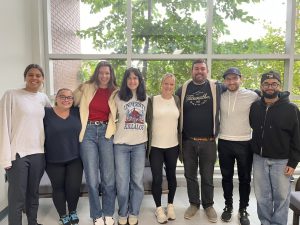
To commemorate the 100th birthday of Journal of Experimental Biology (JEB) in 2023, The Company of Biologists and JEB launched two new grants to champion the emerging talents in comparative physiology and biomechanics. One of our inaugural grant awardees is Erin Leonard from Wilfrid Laurier University, Canada. …
11 July 2024
It can be problematic to perfectly blend social, environmental and financial goals when organising an academic event, but we think that Chrissy Hammond (University of Bristol) and her co-organisers Lizzie Lawrence, Joanna Moss, Nikki Stevenson and Rabia Sevil rose to the challenge at The Dynamic matrix: mechanics, ageing and repair Conference, a British Society for Matrix Biology (BSMB) meeting. We were delighted to support this event from our Fund for Innovations in Sustainable Conferencing and Scientific Meeting Grants, and we are keen to continue supporting events like this in the future.
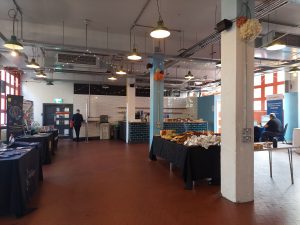 We are very grateful to Chrissy for welcoming us at this event. We had the opportunity to talk with the main stakeholders involved in the planning process and we would like to share with you some of the good practices they implemented whilst organising a green meeting. …
We are very grateful to Chrissy for welcoming us at this event. We had the opportunity to talk with the main stakeholders involved in the planning process and we would like to share with you some of the good practices they implemented whilst organising a green meeting. …
24 October 2023
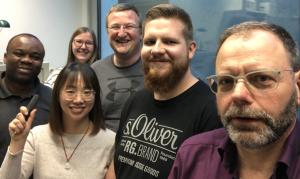
The mitotic spindle is crucial for proper chromosome segregation during cell division. Chromosome segregation takes place in anaphase and previous work has shown that the speed of this process depends on the structure of the spindle. Yitong Xu is a graduate student in Stefano Di Talia’s lab at Duke University, where she studies mitosis and microtubule dynamics in Drosophila melanogaster embryos. Yitong recently used a Travelling Fellowship from Journal of Cell Science to visit Dr Thomas Mueller-Reichert’s lab at the Technische Universität Dresden (TUD) in Germany, to conduct cryogenic electron microscopy (cryo-EM) observations of the Drosophila spindle.
5 September 2025
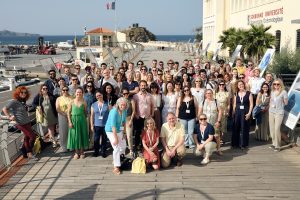
23 June 2025
The Company of Biologists works hard to support innovation that can accelerate sustainable development in the academic event industry. One of the latest projects we have supported through our Fund for Innovations in Sustainable Conferencing is The Pavilion for People, an exciting experiment that was part of the 2025 UN Ocean Conference. The Pavilion for People was an online space created by utilising already existing technology in a new creative way, allowing people from all around the world to interact, share their ideas and make commitments for protecting the oceans. …
16 January 2025
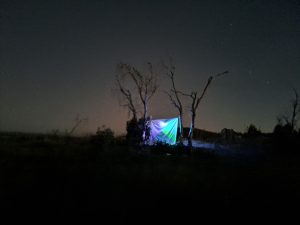
As part of Journal of Experimental Biology’s 100-year anniversary celebration in 2023, The Company of Biologists launched two new funding initiatives aimed at supporting junior faculty staff setting up their first laboratory and research group. This critical career stage is markedly challenging considering the few funding opportunities available. We recognise that junior faculty staff represent the future of the field and created these funding opportunities to continue to support the experimental biology community.
One of our 2024 grant awardees is Pauline Fleischmann from Carl von Ossietzky University Oldenburg, Germany. …
26 March 2024
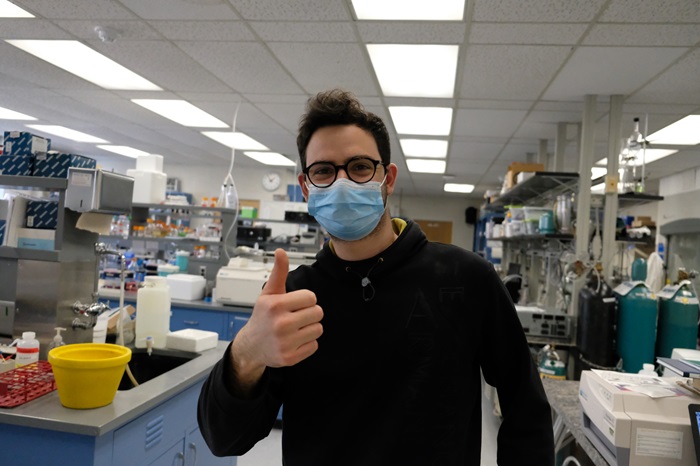
Isoprene is a biogenic volatile compound emitted by many different plants. Above ground, this compound protects plants from a range of abiotic and biotic stresses. But what happens belowground is less clear and it is this question that fascinated Manuel Bellucci, a PhD student in the Department of Science and Technology for Sustainable Development and the Campus Bio-Medico of the University of Rome (Italy).
24 October 2023
Travelling represents the largest carbon impact of an event. It can count for up to 56% of the whole event’s carbon footprint 1, and the impact is significantly higher when international participants use flights to reach the event.
With this in mind, we were delighted to award a Sustainable Conferencing Grant to Dr Serena Stanga who came with a solution that combined technology with alternative travelling, leading to a reduction in travel carbon footprint for her symposium “In pursuit of healthy brain aging: unveiling the biology of novel age-related mechanisms leading to dementia”, which was part of the 20th National Congress of the Italian Society for Neuroscience (SINS) 2. …
You must be logged in to post a comment.